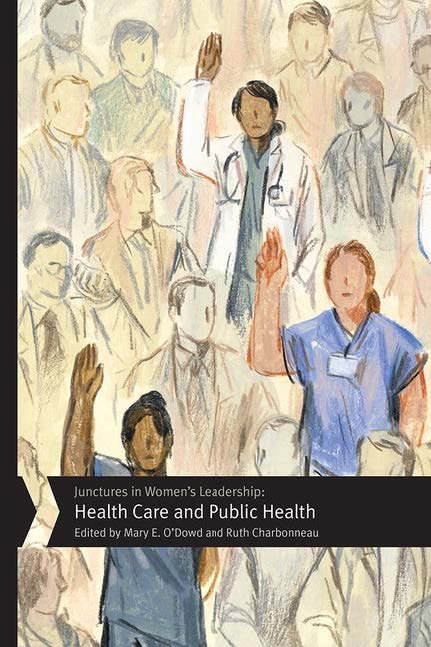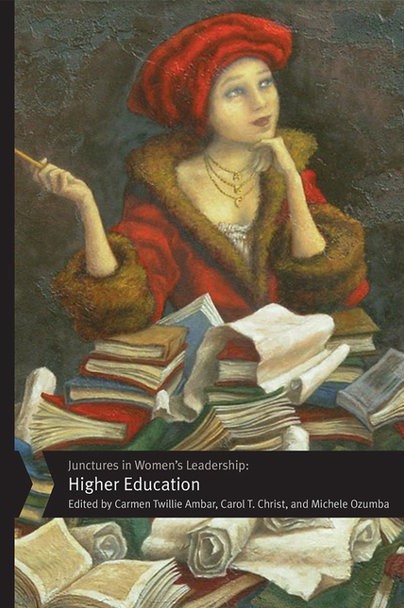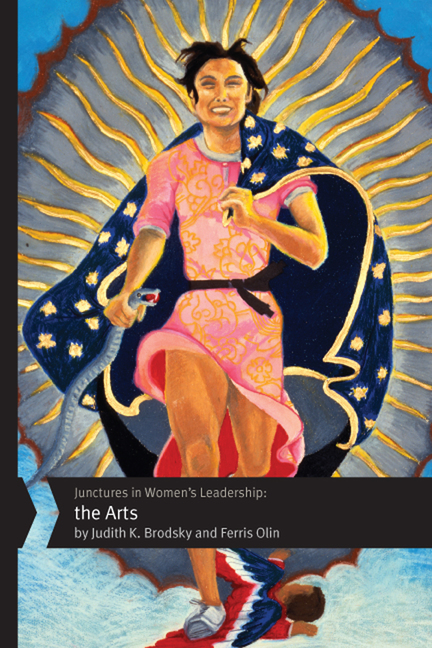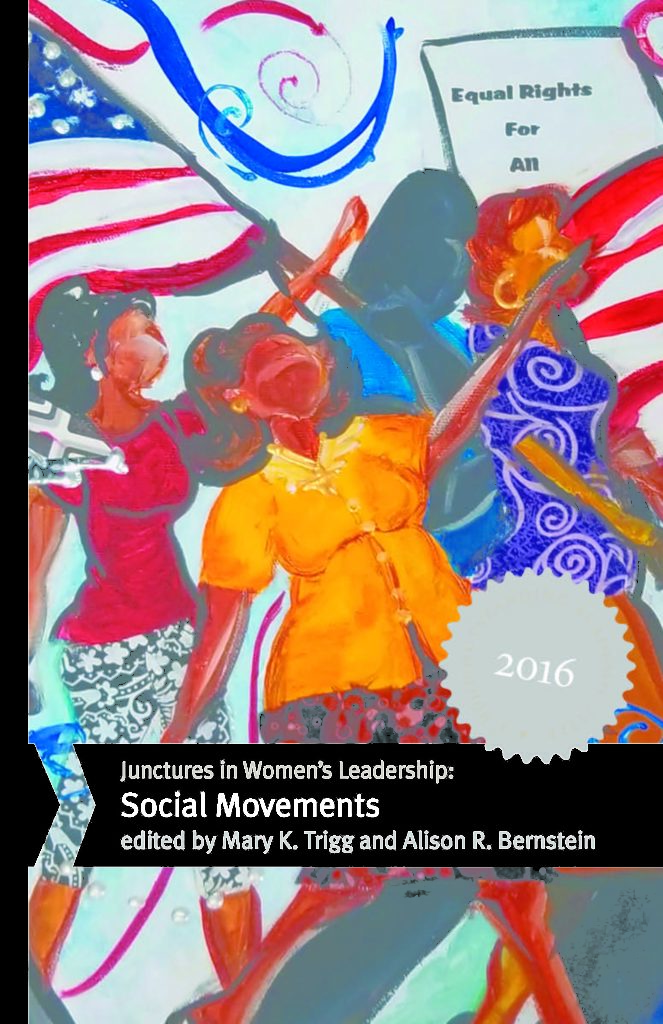Junctures in Women’s Leadership
Using the case study method, Junctures in Women's Leadership explores the diverse ways that women around the world exercise leadership, often overcoming rigid cultural and societal expectations about gender. The cases provide a unique window into the ways women leaders make decisions at critical junctures in their careers. Edited by Mary K. Trigg, Associate Professor, Department of Women’s, Gender, and Sexuality Studies, Rutgers University, and Faculty Director, Leadership Scholars Certificate Program, Junctures in Women’s Leadership is a series of eight books of case studies on women’s leadership to be published by Rutgers University Press. For those who study, teach, or practice leadership, these books offer a bold and useful analysis of women's experiences.
Edited by Mary E. O'Dowd, Ruth Charbonneau (New Brunswick, NJ: Rutgers University Press, 2021).
“Kudos to O’Dowd and Charbonneau for identifying outstanding women leaders to compile these case studies that both humble and inspire the reader. These lessons remind us it takes one person, using both the adversity of their lives and the talents they have acquired, to improve the health of both communities and the world. Never has there been a more important time in healthcare history to extend ourselves to apply both intellect and persistence to leave our mark."
Amy B. Mansue
President and CEO, Inspira Health
Junctures in Women’s Leadership: Health Care and Public Health offers an eclectic compilation of case studies telling the stories of women leaders in public health and health care, from Katsi Cook, Mohawk midwife, to Virginia Apgar, Katharine Dexter McCormick and Florence Schorske Wald, to Marilyn Tavenner, Suerie Moon, and more.
The impact of their work is extraordinarily relevant to the current public discourse including subjects such as the global COVID-19 pandemic, disparities in health outcomes, prevention of disease and the impact of the Affordable Care Act. The leadership lessons gleaned from these chapters can be applied to a broad array of disciplines within government, private business, media, philanthropy, pharmaceutical, environmental and health sectors. Each chapter is authored by a well versed and accomplished woman, demonstrating the book’s theme that there are many paths within health care and public health.
The case study format provides an introductory section providing biographical and historical background, setting the stage for a juncture, or decision point, and the resolution. The women are compelling characters and worth knowing.
Edited by Carmen Twillie Ambar, Carol T. Christ, Michele Ozumba (New Brunswick, NJ: Rutgers University Press, 2020).
"Each of the essays in this volume offers compelling examples of the transformative power of women’s leadership in higher education at all types of institutions. Beyond detailing familiar and persistent barriers that have slowed women’s progress at the highest levels in the academy, the authors showcase models for reforming institutional and organizational cultures in ways that promote structural change and value women’s authentic leadership styles."
Lynn Pasquerella
President of the Association of American Colleges and Universities
Junctures in Women's Leadership: Higher Education illuminates the careers of twelve women leaders whose experiences reveal the complexities of contemporary academic leadership through the intersection of gender, race, and institutional culture. The chapters combine interviews and research to create distinct case studies that identify the obstacles that challenged each woman's leadership, and the strategies deployed to bring about resolution.
The research presented in this volume reveals not only theoretical factors of academic leadership, but also real time dynamics that give the reader deeper insights into the multiple stakeholders and situations that require nimble, relationship-based leadership, in addition to intellectual competency.
With chapters written by many of today's leading women in higher education, this book brings into sharp focus the unique attributes of women leaders in the academy and adds a new dimension of analysis to the field of women’s leadership studies. Women leaders interviewed in this volume include Bernice Sandler, Juliet Villarreal García, and Johnnetta Betsch Cole.
Written by Judith K. Brodsky and Ferris Olin
(New Brunswick, NJ: Rutgers University Press, 2018).
"I was bothered by the fact that the only artists I heard about in school were mostly white men...I felt that there had to be more to this, and of course, in time I encountered women artists like O'Keefe and Kollwitz...I am an American Indian and this gives me a particular kind of perspective. I am an advocate of our issues, but I am also a woman. I feel solidarity with African American, Asian, and Latino artists.
Jaune Quick-To-See Smith
Native American artist and activist
In this third volume of the series Junctures: Case Studies in Women’s Leadership, Judith K. Brodsky and Ferris Olin profile female leaders in music, theater, dance, and visual art. The diverse women included in Junctures in Women's Leadership: The Arts have made their mark by serving as executives or founders of art organizations, by working as activists to support the arts, or by challenging stereotypes about women in the arts.
These case studies show how belief in the importance of the arts and a commitment to feminist principles of social justice led women leaders to transform global culture by dedicating their lives and careers to abolishing the misconception that white men are the only worthy cultural creators and by providing access to the arts for diverse audiences.
Other women may have been leaders in various arts disciplines, but the authors believe the most significant ones were inspired simultaneously by their deep love for the art disciplines in which they were active participants and by their commitment to engaging in the quest for inclusivity of race, gender, and class among the creators in their fields and their audiences. These women in the arts proved that women leaders make a difference.
Edited by Mary K. Trigg and Alison R. Bernstein
(New Brunswick, NJ: Rutgers University Press, 2016).
“If you believe in justice you fight for it wherever you are. The battleground is beneath your feet."
Bhairavi Desai
Founding member of the New York Taxi Workers Alliance, featured in Junctures in Women's Leadership: Social Movements
Selected as 2016 Choice Outstanding Academic Title
From Eleanor Roosevelt to Gloria Steinem to HIV/AIDS activist Dazon Dixon Diallo, women have assumed leadership roles in struggles for social justice. How did these remarkable women ascend to positions of influence? And once in power, what leadership strategies did they use to deal with various challenges?
Junctures in Women’s Leadership: Social Movements explores these questions by introducing twelve women who have spearheaded a wide array of social movements that span the 1940s to the present, working for indigenous peoples’ rights, gender equality, reproductive rights, labor advocacy, environmental justice, and other causes.
The women profiled here work in a variety of arenas across the globe: Planned Parenthood CEO Cecile Richards, New York City labor organizer Bhairavi Desai, women’s rights leader Charlotte Bunch, feminist poet Audre Lorde, civil rights activists Daisy Bates and Aileen Clarke Hernandez, Kenyan environmental activist Wangari Maathai, Nicaraguan revolutionary Mirna Cunningham, and South African public prosecutor Thuli Madonsela. What unites them all is the way these women made sacrifices, asked critical questions, challenged injustice, and exhibited the will to act in the face of often-harsh criticism and violence.
Edited by Lisa Hetfield and Dana M. Britton
(New Brunswick, NJ: Rutgers University Press, 2016).
“There's no reason why a company can't both be a successful business actor and a successful actor in society."
Barbara Krumsiek
Former president and CEO of Calvert Investments Inc., Junctures in Women's Leadership: Business
How have women managed to break through the glass ceiling of the business world, and what management techniques do they employ once they ascend to the upper echelons of power? What difficult situations have these female business leaders faced, and what strategies have they used to resolve those challenges?
Junctures in Women’s Leadership: Business answers these questions by highlighting the professional accomplishments of twelve remarkable women and examining how they responded to critical leadership challenges. Some of the figures profiled in the book are household names, including lifestyle maven Martha Stewart, influential chef Alice Waters, and trailblazing African-American entrepreneur Madame C.J. Walker.
Others have spent less time in the public eye, such as Johnson & Johnson executive JoAnn Heffernan Heisen, Verizon Senior Vice President Diane McCarthy, Wells Fargo technology leader Avid Modjtabai, Xerox CEO Ursula Burns, Spanx founder Sara Blakely, inventor Jane ni Dhulchaointigh, engineering firm President Roseline Marston, Calvert Investments President and CEO Barbara Krumsiek, and Merrill Lynch executive Subha Barry. These women, from diverse backgrounds, have played important roles in their respective corporations and many have worked to improve the climate for women in male-dominated industries.
Not only does the book offer an inspiring composite portrait of women succeeding in the business world, it also provides leadership lessons that will benefit readers regardless of gender.




